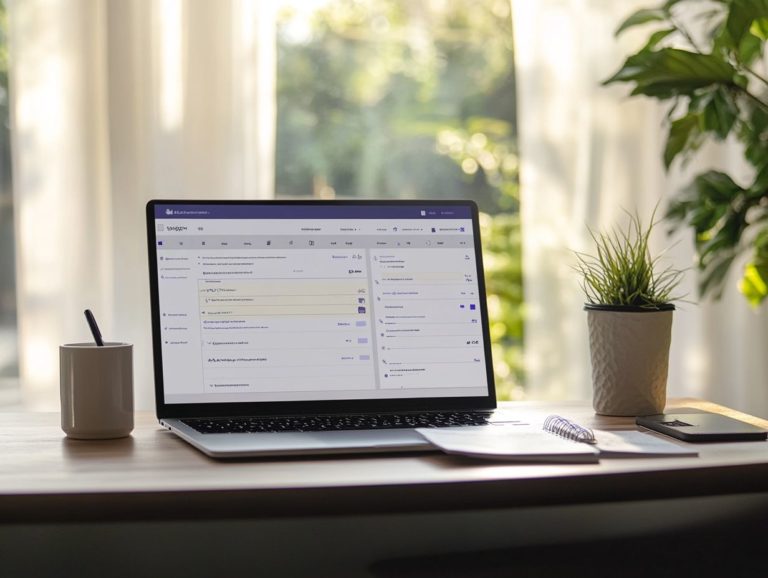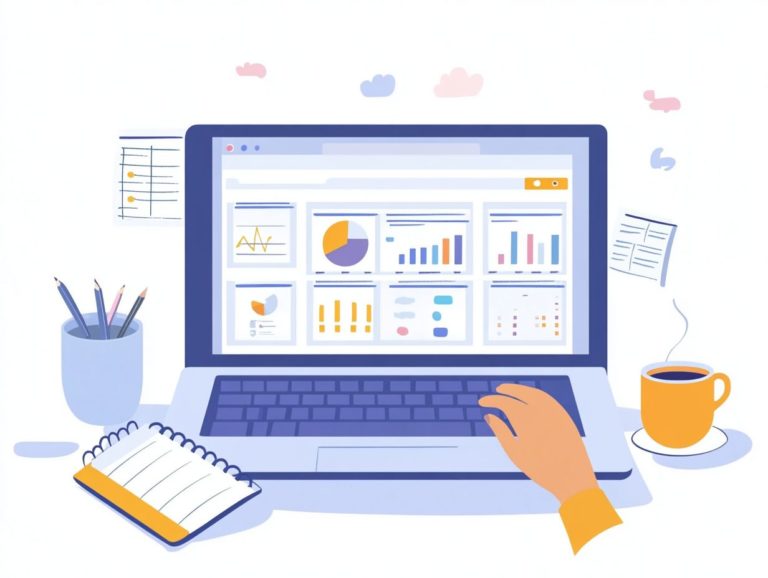Best Practices for CRM Technical Support
In today s fast-paced business landscape, mastering Customer Relationship Management (CRM) software is essential for nurturing strong client connections.
Even the most robust systems can face technical challenges. It s crucial to navigate these hurdles with finesse. This article delves into the key elements of CRM technical support, guiding you through identifying and troubleshooting common issues while fostering clear communication with users.
You ll find best practices, recommended tools, and strategies for ongoing improvement, all aimed at enhancing customer satisfaction and streamlining your support processes.
Dive into the insights below and supercharge your CRM technical support today!
Contents
- Key Takeaways:
- Common Issues in CRM Technical Support
- Effective Communication in Customer Relationship Management (CRM) Technical Support
- Best Practices for Providing CRM Technical Support
- Tools and Resources for CRM Technical Support
- Continuous Improvement in CRM Technical Support
- Frequently Asked Questions
- What are the best practices for providing CRM technical support?
- Why is it important to have a dedicated support team for CRM technical issues?
- How can we ensure prompt response and resolution times for CRM technical support?
- Why is it necessary to keep detailed records of customer interactions and resolutions?
- How often should support processes be reviewed and updated?
- What are some self-service resources for troubleshooting common issues?
Key Takeaways:
- Effective communication is key to successful CRM technical support.
- Continuous improvement is essential for maintaining high levels of customer satisfaction.
- Utilizing recommended software and platforms can significantly improve CRM technical support.
What is CRM Technical Support?
CRM technical support is the lifeline you need for navigating the intricacies of customer relationship management software. It equips you to manage your customer relationships effectively and optimize your CRM processes.
This support encompasses troubleshooting issues, offering user training, and ensuring the integrity of your CRM data all aimed at enhancing customer experience and maximizing the value derived from the various CRM solutions available.
The significance of CRM technical support cannot be overstated; it is essential for maintaining the efficacy of these systems and consequently, understanding how to set up CRM support channels can enhance the overall performance of your business.
Take user training, for instance. It enables your staff to harness platforms like Zoho CRM and Insightly to their full potential, streamlining operations and boosting productivity.
When you face technical hurdles, having access to prompt troubleshooting services is crucial. It minimizes downtime and allows for seamless communication with your clients.
Ultimately, effective support fosters stronger customer relationships by enabling you to respond swiftly to inquiries and manage customer data transparently, leading to heightened satisfaction and loyalty.
Common Issues in CRM Technical Support
Common challenges in CRM technical support often center around user adoption hurdles, data integrity concerns, and system performance inconsistencies. These can impede your effective use of CRM software.
Issues may present themselves in various ways, such as complications with CRM integrations, automation setbacks, or subpar CRM metrics. Ultimately, these challenges can significantly impact how you manage customer relationships and reach your CRM objectives.
Identifying and Troubleshooting Problems
Identifying and troubleshooting issues in CRM technical support is essential for maintaining seamless operations and ensuring effective management of customer relationships. Implementing best practices for customer onboarding with CRM can help address common concerns, such as data integrity issues that could compromise the accuracy of CRM reports, hindering your business processes.
Challenges in user training can limit adoption and overall performance of your CRM tools.
To tackle these issues effectively, it’s crucial to recognize common signs of trouble, such as inconsistent data entries or unusually long loading times.
Regularly cleaning your data can help you eliminate duplicates and outdated information, which is vital for accurate analytics. Utilizing CRM reports can offer deeper insights into usage patterns and performance metrics.
For a more efficient troubleshooting experience, consider leveraging CRM tools like Salesforce’s built-in diagnostic features or HubSpot s reporting functionalities, which can help you identify problems more swiftly.
Conducting training sessions focused on user engagement can further enhance performance and ensure your team is equipped to make the most of the CRM tools at their disposal.
Effective Communication in Customer Relationship Management (CRM) Technical Support

Effective communication in CRM technical support is crucial for you to fully grasp your CRM tools. This enables you to make the most of their features and nurture strong customer relationships.
By fostering open dialogue and actively seeking your feedback, support teams can help you overcome challenges. They can also enhance your overall CRM experience by offering comprehensive user training.
Tips for Clear and Efficient Communication
Tips for clear and efficient communication in CRM technical support include actively listening to user concerns. Providing detailed explanations of CRM processes and utilizing visual aids can also enhance understanding, especially when following best practices for CRM vendor relationships.
These strategies are essential for ensuring that you can effectively utilize CRM software. Ultimately, they lead to improved relationships with your customers and better overall CRM performance.
By embracing clarity, you can minimize misunderstandings that often arise from jargon-heavy discussions. For example, if you re grappling with data entry issues, breaking down the process into simple, illustrative steps can eliminate confusion.
Active listening is equally crucial. It means not just hearing but genuinely understanding user queries. When challenges arise, such as a user misinterpreting troubleshooting steps, clarifying the instructions with diagrams or screenshots can make a significant difference.
Being aware of cultural differences in communication styles enhances rapport and facilitates smoother interactions. This ensures that every conversation is productive and supportive.
Best Practices for Providing CRM Technical Support
Delivering exceptional CRM technical support can transform your customer interactions! You should embrace a variety of strategies, including the best practices for ongoing CRM training, tailored to enhance the effectiveness of CRM software.
This entails developing a detailed plan for setting up CRM, delivering continual training for users, and assessing processes to pinpoint opportunities for improvement.
Strategies for Resolving Issues
Strategies for resolving issues in CRM technical support require a systematic approach. This approach prioritizes understanding your needs and effectively addressing your challenges, including implementing best practices for CRM user access management.
By implementing proactive support measures like scheduled check-ins and regular training sessions you can significantly enhance CRM user adoption. This improves the overall performance of your CRM systems.
Engaging users in the feedback loop is essential for identifying specific pain points. This allows you to tailor solutions that truly fit their requirements.
For instance, a leading retail company noticed a decline in CRM utilization due to navigational complexities. By conducting user surveys, they pinpointed key issues and quickly organized targeted training workshops to address those gaps.
This not only revived user interest but also fostered a culture of ongoing improvement. Consistently aligning technical support with user expectations is crucial for sustained success.
This alignment ensures that every team member feels enabled and capable of leveraging the CRM’s full potential.
Tools and Resources for CRM Technical Support

Tools and resources for CRM technical support are vital for offering effective assistance. They help you navigate CRM software and ensure seamless integrations, which are essential for implementing CRM best practices for sales team success.
By leveraging a range of CRM tools, you can enhance your troubleshooting capabilities and facilitate user training. This maintains the integrity of the CRM data that is crucial for managing customer relationships effectively.
Start utilizing these strategies today to enhance your CRM experience!
Recommended Software and Platforms
Explore top Customer Relationship Management (CRM) software that enhances user experience. These platforms will help you manage customer relationships effectively.
Consider popular CRM vendors like Zoho CRM, Pipedrive, and Insightly. They provide robust features and seamless integrations designed for effective CRM support.
These platforms not only track customer interactions but also come equipped with advanced reporting capabilities. This enables you to analyze data for improved decision-making.
For instance, Zoho CRM uses data analysis powered by artificial intelligence to predict customer needs. Pipedrive focuses on visual sales pipelines, simplifying lead management for your team. Insightly stands out with project management tools, ideal for businesses seeking to integrate CRM with project oversight.
By assessing your specific needs like essential integrations and team size you can align yourself with a CRM solution that maximizes both efficiency and user satisfaction.
Continuous Improvement in CRM Technical Support
Continuous improvement in CRM technical support is essential for adapting to evolving user needs and elevating the overall customer experience by implementing best practices in CRM data management.
Gathering and analyzing customer feedback consistently helps pinpoint weaknesses in your CRM processes. This allows for informed adjustments to your support strategies.
This proactive approach leads to enhanced CRM performance and increased user satisfaction, distinguishing you in a competitive landscape.
Methods for Enhancing Customer Satisfaction
To enhance customer satisfaction in CRM technical support, consider implementing structured feedback loops and referring to best practices for effective CRM communication while offering personalized support.
Timely responses to user inquiries are also crucial. Focusing on these areas will strengthen customer relationships and foster a positive CRM experience.
Integrating customer feedback mechanisms captures valuable insights directly from users. This informs future enhancements and tailors your service offerings to better meet their needs.
Personalized interactions, such as addressing customers by name, cultivate a more empathetic approach that resonates deeply with clients.
Responsive communication is essential; quick and effective replies not only resolve issues efficiently but also demonstrate your commitment to customer care.
This comprehensive strategy will create a more engaged customer base, driving loyalty and long-term success in your CRM initiatives.
Frequently Asked Questions

What are the best practices for providing CRM technical support?
Best practices include:
- A dedicated support team with trained professionals
- Ensuring fast response and resolution times
- Offering multiple support channels, such as phone, email, and chat
- Keeping detailed records of customer interactions
- Regularly reviewing and updating support processes
- Providing self-service resources for common issues
- Continuously training and upskilling support staff
Why is it important to have a dedicated support team for CRM technical issues?
A dedicated support team for CRM technical issues ensures timely and accurate assistance. These professionals are well-trained in the CRM software and are best equipped to handle technical issues. For more insights, refer to best practices for using CRM software. They also alleviate the burden on other departments, allowing them to focus on core responsibilities.
How can we ensure prompt response and resolution times for CRM technical support?
To ensure prompt response and resolution times, it’s crucial to have a well-defined support process. This includes clearly communicating response times, prioritizing urgent issues, and setting up automated notifications for updates. Having a skilled support team that can quickly identify and resolve technical issues is also essential.
Act now to enhance your CRM support! Implement feedback loops and personalized support to keep customers happy.
Why is it necessary to keep detailed records of customer interactions and resolutions?
Keeping detailed records of customer interactions and resolutions is crucial for effective support. These records help us resolve similar issues more quickly.
They also highlight patterns and recurring problems. By addressing these, we can improve processes and update our products.
These records also assist in future interactions with the same customer.
How often should support processes be reviewed and updated?
Support processes must be reviewed regularly to stay efficient. A quarterly review is ideal, especially when we introduce new features.
It’s essential to involve the support team during this review. They have the best insights into current processes and can suggest valuable improvements.
What are some self-service resources for troubleshooting common issues?
Self-service resources like FAQs, knowledge base articles, video tutorials, and community forums can be very helpful. These tools empower customers to find solutions quickly.
They also reduce the workload for our support team, allowing them to focus on more complex issues.






